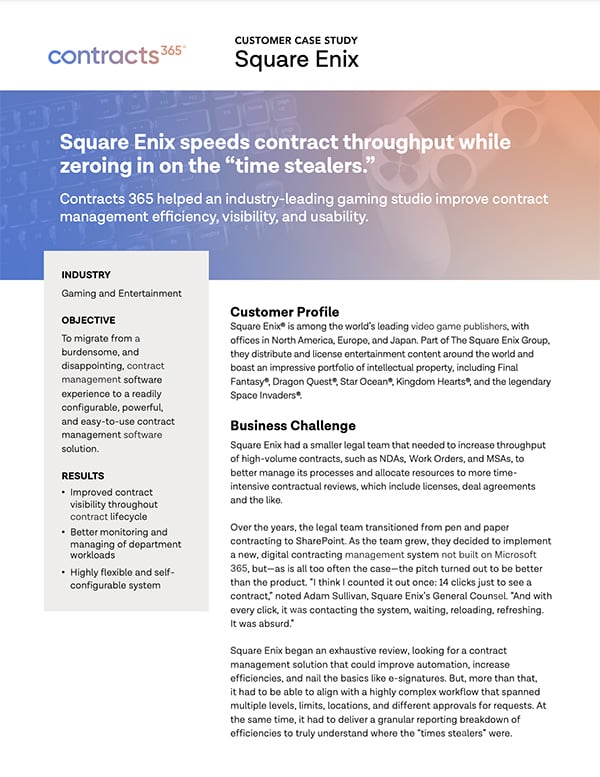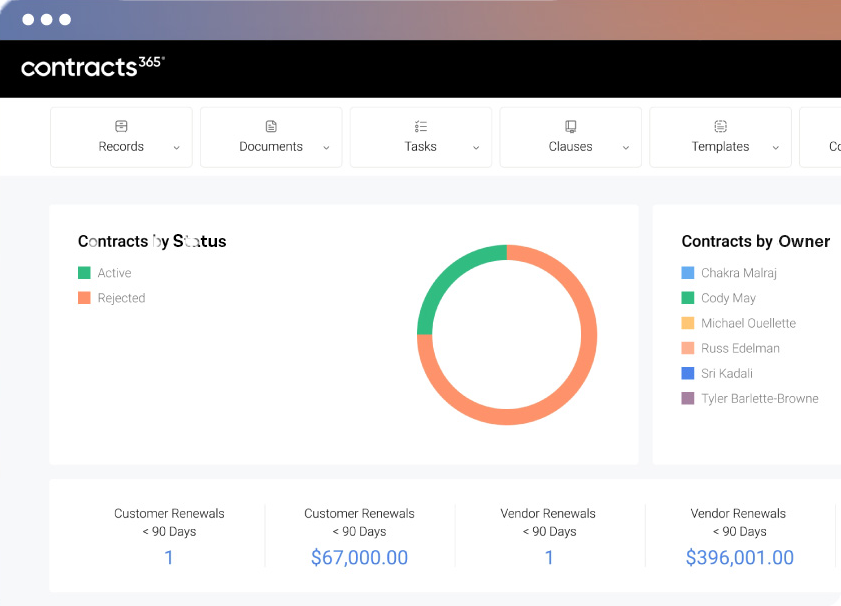Contract management software has features that help companies draft, negotiate and manage contractual agreements. When used effectively, contract management software can mitigate risk during the contract process, ensure compliance, drive productivity, and increase end-to-end visibility so all parties involved can stay informed.
Contract management software systems range from very simple to extremely sophisticated. The following eight features are considered “must-haves” for mid to large size companies.
1. Contract Repository
Contract management software can act as a central repository for contracts throughout the lifecycle. The most effective contract repository features let you add metadata such as the customer's name, the contract's creation date, and the date that parties signed a contract. The ability to add meta tags helps people locate contracts. Full-text search offers additional functionality by letting employees search for contracts by keywords, clauses, and other elements in a document.
Role-based security features provide access to authorized individuals while preventing others from viewing sensitive data or documents in the repository. Storing contracts in the cloud reduces the need for excessive emails and paper documents.
2. Contract Templates
Many companies use the same types of contracts repeatedly. Contract management software that lets you create and manage pre-approved templates simplifies the contract authoring process and helps companies enforce their standardized language across even the largest companies.
3. Clause Library
Clause libraries allow legal teams to develop pre-approved language that make contract creation and negotiation processes more efficient. For example, when legal teams are creating contract templates, the process is often as simple as selecting clauses from the clause library and arranging them in the appropriate order. Another example is when an outside party will not accept the terms in a specific clause, the clause library can house alternate fallback language written for these repeatable situations and ready at a moment’s notice.
4. Workflow Automation
Contracts often take circuitous paths before all sides can agree on a final version. The more complex a contract is, the more time internal and external parties need to spend reviewing the document. Contract management software that includes workflow automation makes it easier to track the process and automate certain aspects of contract creation.
At each stage of negotiations, events can trigger automated workflows that improve efficiency, prevent bottlenecks, and inform everyone of updates.
5. Tools to Strengthen Negotiations
High-value and complex contracts can require multiple rounds of negotiations. At each stage, parties get closer to an agreement they can accept. The more complex a contract is, though, the more time it takes for parties to review agreements, talk to their legal teams, and project how the contract will affect them in the future.
Contract management software that tracks every change made to contracts helps all parties understand how the document evolves over time. Instead of sitting down to read every line in a contract, they can focus their attention on recent revisions.
Software can store all versions of a contract, so it's possible for companies and individuals to review past versions. With the contract's entire history stored in a central repository, it's easier for all parties to stay apprised of changes so they can reach an agreement. Read more about 5 ways that contract management software can strengthen your negotiations.
6. Approvals and Signatures
Each organization takes a slightly unique approach to approving and signing contracts. In some cases, the approval process may require signatures from several people, which further complicates the ability to finalize an agreement.
An excellent contract management software system has the flexibility to match and improve the efficiency of each organization's existing practice. Software can also help streamline the process by moving the contract forward through each stage. If someone rejects a change, then the contract remains in the negotiation phase. When it moves forward, again, the management software tracks that progress and alerts authorized parties of any changes.
Alerts keep everyone informed of the contract's progress and prevents delays. Since everyone receives alerts, no one can claim that they didn't know about recent revisions.
Once all parties complete their negotiations, the contract moves to a secure cloud repository where everyone can provide their electronic signatures. By keeping the contract in the cloud, you benefit from a shorter process with fewer emails, scans, and uploads. You also benefit from reducing the amount of paper and ink traditionally needed to complete a contract.
Download the Grant Public Utilities Case Study
Learn More
7. Detailed Reporting & Metrics
Contract management software provides insight into your contract process. When you use paper contracts, it's difficult to find inefficiencies that prevent your company from improving its process. With the right software, though, you get a report that includes objective data that you can use to optimize your process, improve your partner relationships, and potentially increase your revenues.
Reports may include data points such as how many times a contract was revised, whether the contract's obligations have been met, and which vendors insist on non-standard clauses. These and other pieces of information make it possible for you to spot patterns that will inform your future negotiations. Read more about our core contract management KPIs that you should be tracking for every department.
8. Seamless Integration
Today’s businesses rely on many software applications to run their day-to-day operations. Customer relationship management (CRM), enterprise resource planning (ERP), electronic signature and supply chain solutions are common examples.
By integrating these technologies with your contract management software, you get deeper insights, save money, increase efficiencies and enable better decision making.
In summary, contract management software is important for many businesses, and we have outlined the key functions. However, the world of contract management software is a constantly evolving mix of technology, trends, and best practices. It is not always clear what specific features are most valuable. Should you initiate a contract management software solution for your business, we have created a more detailed and in-depth list of 10 essential contract management tools.
If your business counts on contracts to function, it makes sense to consider getting a Contract Management Software system in place. If you’d like to learn more about our Contract Management Software for businesses that run Microsoft 365, please don’t hesitate to reach out to us or even better, request a demo, and we can show you how it works in real-time.
Subscribe and receive our latest blog articles in your work email.
We value your privacy. By subscribing, you agree to receive our newsletter. We’ll protect your personal data and use your email only for sending useful information. You can unsubscribe anytime. For details on data handling, please see our privacy policy.
Ready to Learn More?
Optimize your team’s contract lifecycle management with Contracts 365®
